(完整版)反义疑问句经典练习题(答案)
- 格式:doc
- 大小:47.51 KB
- 文档页数:6
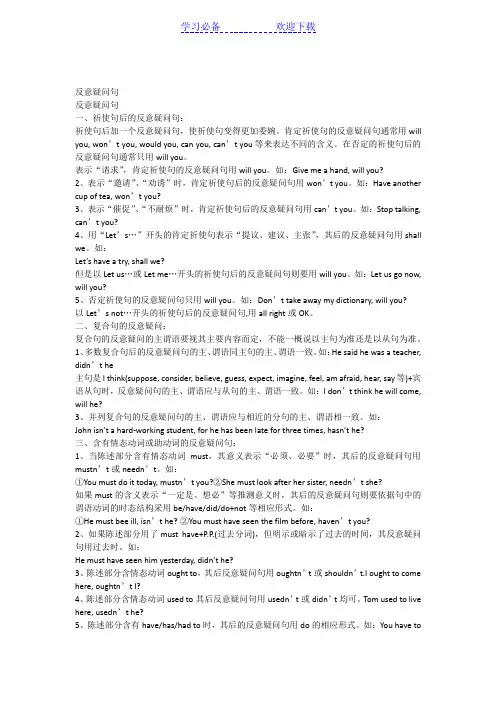
反意疑问句反意疑问句一、祈使句后的反意疑问句:祈使句后加一个反意疑问句,使祈使句变得更加委婉。
肯定祈使句的反意疑问句通常用will you, won’t you, would you, can you, can’t you等来表达不同的含义。
在否定的祈使句后的反意疑问句通常只用will you。
表示“请求”,肯定祈使句的反意疑问句用will you。
如:Give me a hand, will you?2、表示“邀请”、“劝诱”时,肯定祈使句后的反意疑问句用won’t you。
如:Have another cup of tea, won’t you?3、表示“催促”、“不耐烦”时,肯定祈使句后的反意疑问句用can’t you。
如:Stop talking, can’t you?4、用“Let’s…”开头的肯定祈使句表示“提议、建议、主张”,其后的反意疑问句用shall we。
如:Let’s have a try, shall we?但是以Let us…或Let me…开头的祈使句后的反意疑问句则要用will you。
如:Let us go now, will you?5、否定祈使句的反意疑问句只用will you。
如:Don’t take away my dictionary, will you?以Let’s not…开头的祈使句后的反意疑问句,用all right或OK。
二、复合句的反意疑问:复合句的反意疑问的主谓语要视其主要内容而定,不能一概说以主句为准还是以从句为准。
1、多数复合句后的反意疑问句的主、谓语同主句的主、谓语一致。
如:He said he was a teacher, didn’t he主句是I think(suppose, consider, believe, guess, expect, imagine, feel, am afraid, hear, say等)+宾语从句时,反意疑问句的主、谓语应与从句的主、谓语一致。
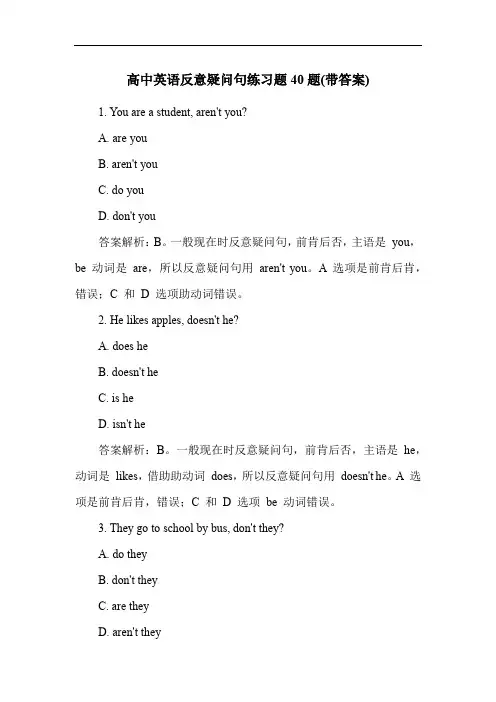
高中英语反意疑问句练习题40题(带答案)1. You are a student, aren't you?A. are youB. aren't youC. do youD. don't you答案解析:B。
一般现在时反意疑问句,前肯后否,主语是you,be 动词是are,所以反意疑问句用aren't you。
A 选项是前肯后肯,错误;C 和D 选项助动词错误。
2. He likes apples, doesn't he?A. does heB. doesn't heC. is heD. isn't he答案解析:B。
一般现在时反意疑问句,前肯后否,主语是he,动词是likes,借助助动词does,所以反意疑问句用doesn't he。
A 选项是前肯后肯,错误;C 和D 选项be 动词错误。
3. They go to school by bus, don't they?A. do theyB. don't theyC. are theyD. aren't they答案解析:B。
一般现在时反意疑问句,前肯后否,主语是they,动词是go,借助助动词do,所以反意疑问句用don't they。
A 选项是前肯后肯,错误;C 和D 选项be 动词错误。
4. She is beautiful, isn't she?A. is sheB. isn't sheC. does sheD. doesn't she答案解析:B。
一般现在时反意疑问句,前肯后否,主语是she,be 动词是is,所以反意疑问句用isn't she。
A 选项是前肯后肯,错误;C 和D 选项助动词错误。
5. We have lunch at school, don't we?A. do weB. don't weC. have weD. haven't we答案解析:B。
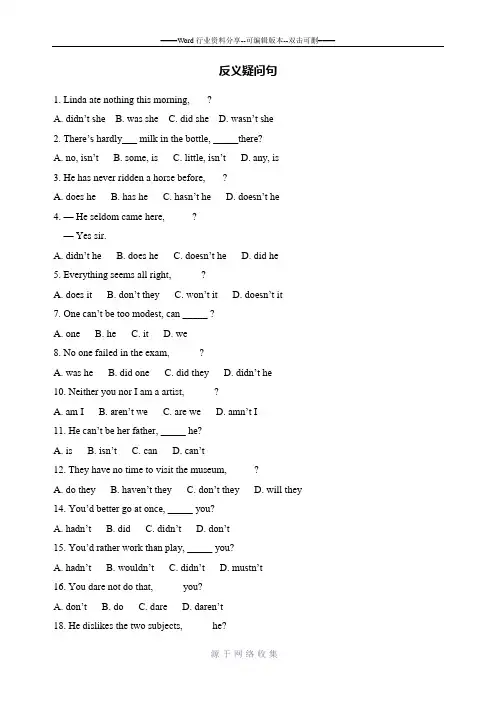
反义疑问句1. Linda ate nothing this morning, ___?A. didn’t sheB. was sheC. did sheD. wasn’t she2. There’s hardly___ milk in the bottle, _____there?A. no, isn’tB. some, isC. little, isn’tD. any, is3. He has never ridden a horse before, ___?A. does heB. has heC. hasn’t heD. doesn’t he4. — He seldom came here, _____?— Yes sir.A. didn’t heB. does heC. doesn’t heD. did he5. Everything seems all right, _____ ?A. does itB. don’t theyC. won’t itD. doesn’t it7. One can’t be too modest, can _____ ?A. oneB. heC. itD. we8. No one failed in the exam, _____ ?A. was heB. did oneC. did theyD. didn’t he10. Neither you nor I am a artist, _____ ?A. am IB. aren’t weC. are weD. amn’t I11. He can’t be her father, _____ he?A. isB. isn’tC. canD. can’t12. They have no time to visit the museum, _____?A. do theyB. haven’t theyC. don’t theyD. will they14. You’d better go at once, _____ you?A. hadn’tB. didC. didn’tD. don’t15. You’d rather work than play, _____ you?A. hadn’tB. wouldn’tC. didn’tD. mustn’t16. You dare not do that, _____ you?A. don’tB. doC. dareD. daren’t18. He dislikes the two subjects, _____ he?A. doesB. d oesn’tC. isD. isn’t19. These tools are useless now, _____ ?A. are theyB. aren’t theyC. is itD. isn’t it20. He used to get up at 6:30, _____ he?A. didn’t heB. did heC. used heD. wouldn’t he22. He ought to win the first prize, _______ he?A. mustn’tB. oughtn’tC. shouldn’tD. Both B and C.23. Let’s go there by bus, ___?A. will youB. shall weC. don’t youD. will you24. Let us go to play football, ___?A. will youB. shall weC. do weD. are we25. Don’t forget to give Polly some food and change her water, ___?A. will youB. shall weC. won’t youD. do you26. —Let’s go shopping this afternoon, _____?— All right.A. will weB. shall weC. don’t weD. are we27. — Pass me the dictionary, _____?— Yes, with pleasure.A. would youB. will youC. won’t youD. wouldn’t you30. There is little water in the glass, ____?A. isn’t thereB. isn’t itC. is itD. is there32. There won’t be any concert this Saturday even ing, _____ ?A. will there notB. will thereC. is thereD. won’t33. — I guess she taught herself Japanese, ______?— Yes.A. don’t IB. did sheC. do ID. didn’t she34. I don’t believe you are right, _____ ?A. are youB. do youC. won’t youD. do35. She doesn’t think that Tom sings best in the class, _____ ?A. does sheB. doesn’t sheC. does heD. doesn’t he37. I know you didn’t want to hurt me, _____ ?A. did youB. didn’t youC. do ID. don’t I38. If my father were here he would be very happy, _____ ?A. weren’t heB. were heC. wouldn’t heD. would heKey: 1—5 CDBDD 6—10 BACDC 11—15 AABAB 16—20 CCBBA 21—25CDBAA 26—30BBBAD 31—35 BBDAA 36—38 AAC。
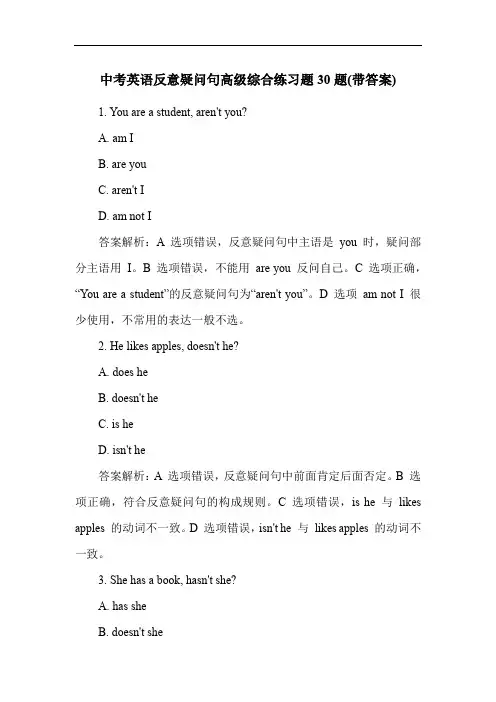
中考英语反意疑问句高级综合练习题30题(带答案)1. You are a student, aren't you?A. am IB. are youC. aren't ID. am not I答案解析:A 选项错误,反意疑问句中主语是you 时,疑问部分主语用I。
B 选项错误,不能用are you 反问自己。
C 选项正确,“You are a student”的反意疑问句为“aren't you”。
D 选项am not I 很少使用,不常用的表达一般不选。
2. He likes apples, doesn't he?A. does heB. doesn't heC. is heD. isn't he答案解析:A 选项错误,反意疑问句中前面肯定后面否定。
B 选项正确,符合反意疑问句的构成规则。
C 选项错误,is he 与likes apples 的动词不一致。
D 选项错误,isn't he 与likes apples 的动词不一致。
3. She has a book, hasn't she?A. has sheB. doesn't sheC. does sheD. haven't she答案解析:A 选项错误,has 在这里是实义动词,不能直接用has she 反问。
B 选项正确,has 的否定形式为doesn't have,反意疑问句用doesn't she。
C 选项错误,does she 与has a book 的动词不一致。
D 选项错误,haven't she 形式错误。
4. They went to the park, didn't they?A. did theyB. didn't theyC. do theyD. don't they答案解析:A 选项错误,反意疑问句中前面肯定后面否定。
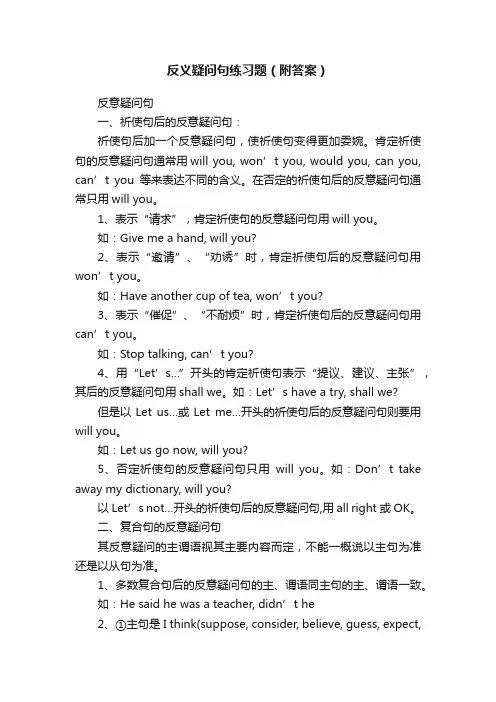
反义疑问句练习题(附答案)反意疑问句一、祈使句后的反意疑问句:祈使句后加一个反意疑问句,使祈使句变得更加委婉。
肯定祈使句的反意疑问句通常用will you, won’t you, would you, can you, can’t you等来表达不同的含义。
在否定的祈使句后的反意疑问句通常只用will you。
1、表示“请求”,肯定祈使句的反意疑问句用will you。
如:Give me a hand, will you?2、表示“邀请”、“劝诱”时,肯定祈使句后的反意疑问句用won’t you。
如:Have another cup of tea, won’t you?3、表示“催促”、“不耐烦”时,肯定祈使句后的反意疑问句用can’t you。
如:Stop talking, can’t you?4、用“Let’s…”开头的肯定祈使句表示“提议、建议、主张”,其后的反意疑问句用shall we。
如:Let’s have a try, shall we?但是以Let us…或Let me…开头的祈使句后的反意疑问句则要用will you。
如:Let us go now, will you?5、否定祈使句的反意疑问句只用will you。
如:Don’t take away my dictionary, will you?以Let’s not…开头的祈使句后的反意疑问句,用all right或OK。
二、复合句的反意疑问句其反意疑问的主谓语视其主要内容而定,不能一概说以主句为准还是以从句为准。
1、多数复合句后的反意疑问句的主、谓语同主句的主、谓语一致。
如:He said he was a teacher, didn’t he2、①主句是I think(suppose, consider, believe, guess, expect,imagine, feel, am afraid, hear, say等)+宾语从句时,反意疑问句的主、谓语应与从句的主、谓语一致。
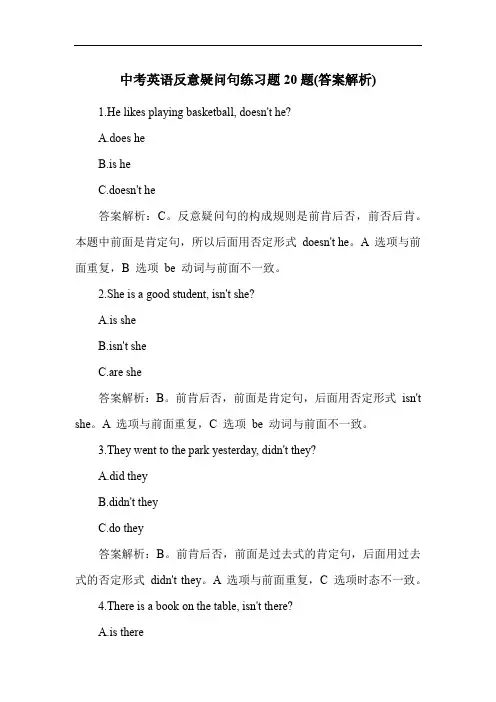
中考英语反意疑问句练习题20题(答案解析)1.He likes playing basketball, doesn't he?A.does heB.is heC.doesn't he答案解析:C。
反意疑问句的构成规则是前肯后否,前否后肯。
本题中前面是肯定句,所以后面用否定形式doesn't he。
A 选项与前面重复,B 选项be 动词与前面不一致。
2.She is a good student, isn't she?A.is sheB.isn't sheC.are she答案解析:B。
前肯后否,前面是肯定句,后面用否定形式isn't she。
A 选项与前面重复,C 选项be 动词与前面不一致。
3.They went to the park yesterday, didn't they?A.did theyB.didn't theyC.do they答案解析:B。
前肯后否,前面是过去式的肯定句,后面用过去式的否定形式didn't they。
A 选项与前面重复,C 选项时态不一致。
4.There is a book on the table, isn't there?A.is thereB.isn't thereC.are there答案解析:B。
前肯后否,前面是there be 句型的肯定句,后面用there be 句型的否定形式isn't there。
A 选项与前面重复,C 选项be 动词与前面不一致。
5.He can swim well, can't he?A.can heB.can't heC.does he答案解析:B。
前肯后否,前面是肯定句,后面用否定形式can't he。
A 选项与前面重复,C 选项助动词与前面不一致。
6.She has a pen, doesn't she?A.does sheB.doesn't sheC.has she答案解析:B。
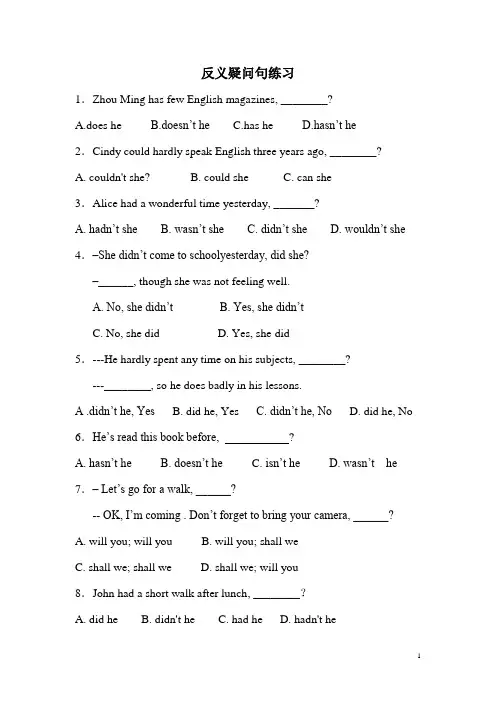
反义疑问句练习1.Zhou Ming has few English magazines, ________?A.does heB.doesn’t heC.has heD.hasn’t he2.Cindy could hardly speak English three years ago, ________?A. couldn't she?B. could sheC. can she3.Alice had a wonderful time yesterday, _______?A. hadn’t sheB. wasn’t sheC. didn’t sheD. wouldn’t she 4.–She didn’t come to schoolyesterday, did she?–______, though she was not feeling well.A. No, she didn’tB. Yes, she didn’tC. No, she didD. Yes, she did5.---He hardly spent any time on his subjects, ________?---________, so he does badly in his lessons.A .didn’t he, Yes B. did he, Yes C. didn’t he, No D. did he, No 6.He’s read this book before, ?A. hasn’t heB. doesn’t heC. isn’t heD. wasn’t he 7.–Let’s go for a walk, ______?-- OK, I’m coming . Don’t forget to bring your camera, ______? A. will you; will you B. will you; shall weC. shall we; shall weD. shall we; will you8.John had a short walk after lunch, ________?A. did heB. didn't heC. had heD. hadn't he9.Nancy hardly rings you up, ___________?A. doesn’t sheB. does sheC. doesn’t NancyD. does Nancy 10.---Your brother often disagrees with you, _______ he ?--- _______. We often have different opinions.A.does; YesB. doesn’t ;YesC. does; NoD. doesn’t; No 11.Kate’s never late for school,?A.isn’t sheB.hasn’theC.is sheD.has she12.--- Liu Tao has never read the book The Adventure of Tom Sawyer , _______ he?--- _____. He told me it's very interesting. He'd like to read it again.A. is; No, he isn'tB. has; Yes, he hasC. isn’t; Yes, he isD. hasn’t; No, he hasn't13.—He’s never late for school, ________?—No, he isn’t .He is always very early.A. is heB. isn’t heC. hasn’t heD. has he 14.—There’s little meat left in the fridge, ________?—________. I’ll get some on my way home.A. is there, YesB. isn’t there, YesC. is there, NoD. isn’t there, No15.—Tom finished his homework, didn’t he?—__________, though he was ill yesterday.A. No, he didn’tB. Yes, he didC. Yes, he doesD. No, he doesn’t16.There is little water in the cup, ?A. is thereB. isn’t thereC. isn’t itD. is it17. He’s still not understood by his close friend although he has said sorryto him, _________?A. hasn’t heB. has heC. isn’t heD. is he18.You have never visited the place before, you?A. didB. didn’tC. haveD. haven’t19.Don't keep poison in the kitchen, _______?A. do youB. shall weC. will youD. don't you20.There are no museums in our city, _________?A. aren’t thereB. are thereC. is thereD. isn’t there21.Your father is playing the piano very well, he?A.isB.isn’tC.doesD.doesn’t22.—It’s her birthday tomorrow, ______ ?—Yes, let’s have a surprise party for her.A. isn’t itB. isn’t sheC. doesn’t itD. doesn’t she23.--- He’s never stolen anything before, _______ he?--- ________. It’s h is third time to be taken to the police station.A. hasn’t; YesB. has; NoC. has; YesD. is; No24.—It’s her birthday tomorrow, ______ ?—Yes, let’s have a surprise party for her.A. isn’t itB. isn’t sheC. doesn’t itD. doesn’t she25.-----Your father never watched the drama series on TV, __________? -----_____________________. He thinks theses drama series are boring and dull.A.does he; Yes, he does.B. does he; No, he doesn’tC. doesn’t he ; Yes, he does.D. doesn’t he ; No, he doesn’t .26.—Tom is an honest boy, _______ he?—Yes. We trust him all the time.A. isn’tB. isC. doesD. doesn’t27.Good, you’ve done it well! You need no more help from us, ______.?A. do youB. need youC. don’t youD. needn’t you28.His father had an important meeting just now, _______?A. did heB. had heC. didn't heD. hadn't he29.-- You used to be short, didn’t you?-- _______. I was the shortest in my class.A. Yes, I did.B. No, I didn’t.C. Yes, I was.D. No, I wasn’t.30.The farmer is wo rking now. He’s fed the horse and the sheep, _____?A. doesn’t heB. isn’t heC. wasn’t heD. hasn’t he参考答案1.A【解析】试题分析:句意为:周明几乎没有英语杂志对吗?这是一个反义疑问句,反义疑问句的结构遵循前肯定后否定或者前否定后肯定,前后人称、时态一致的原则。
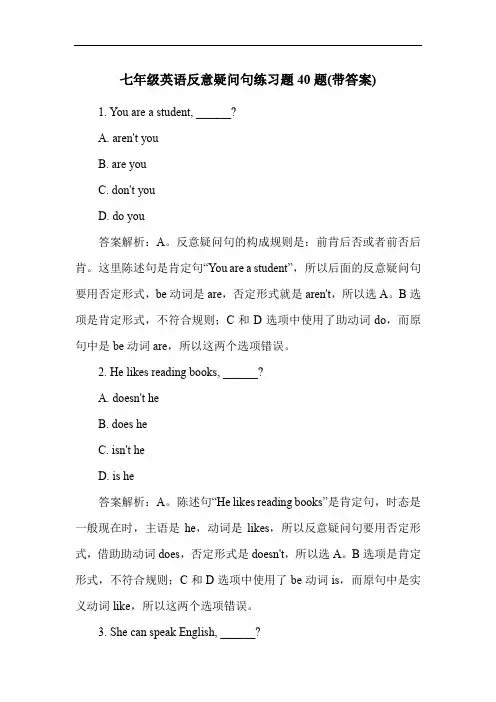
七年级英语反意疑问句练习题40题(带答案)1. You are a student, ______?A. aren't youB. are youC. don't youD. do you答案解析:A。
反意疑问句的构成规则是:前肯后否或者前否后肯。
这里陈述句是肯定句“You are a student”,所以后面的反意疑问句要用否定形式,be动词是are,否定形式就是aren't,所以选A。
B选项是肯定形式,不符合规则;C和D选项中使用了助动词do,而原句中是be动词are,所以这两个选项错误。
2. He likes reading books, ______?A. doesn't heB. does heC. isn't heD. is he答案解析:A。
陈述句“He likes reading books”是肯定句,时态是一般现在时,主语是he,动词是likes,所以反意疑问句要用否定形式,借助助动词does,否定形式是doesn't,所以选A。
B选项是肯定形式,不符合规则;C和D选项中使用了be动词is,而原句中是实义动词like,所以这两个选项错误。
3. She can speak English, ______?A. can't sheB. can sheC. doesn't sheD. does she答案解析:A。
陈述句“She can speak English”是肯定句,有情态动词can,所以反意疑问句要用否定形式,即can't she,所以选A。
B 选项是肯定形式,不符合规则;C和D选项中使用了助动词does,而原句中是情态动词can,所以这两个选项错误。
4. They went to the park yesterday, ______?A. didn't theyB. did theyC. don't theyD. do they答案解析:A。
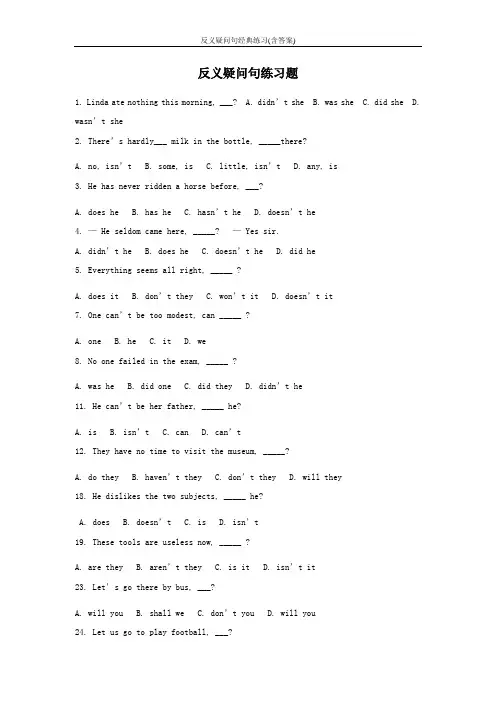
反义疑问句练习题1. Linda ate nothing this morning, ___? A. didn’t she B. was she C. did she D. wasn’t she2. There’s hardly___ milk in the bottle, _____there?A. no, isn’tB. some, isC. little, isn’tD. any, is3. He has never ridden a horse before, ___?A. does heB. has heC. hasn’t heD. doesn’t he4. — He seldom came here, _____? — Yes sir.A. didn’t heB. does heC. doesn’t heD. did he5. Everything seems all right, _____ ?A. does itB. don’t theyC. won’t itD. doesn’t it7. One can’t be too modest, can _____ ?A. oneB. heC. itD. we8. No one failed in the exam, _____ ?A. was heB. did oneC. did theyD. didn’t he11. He can’t be her father, _____ he?A. isB. isn’tC. canD. can’t12. They have no time to visit the museum, _____?A. do theyB. haven’t theyC. don’t theyD. will they18. He dislikes the two subjects, _____ he?A. doesB. doesn’tC. isD. isn’t19. These tools are useless now, _____ ?A. are theyB. aren’t theyC. is itD. isn’t it23. Let’s go there by bus, ___?A. will youB. shall weC. don’t youD. will you24. Let us go to play football, ___?A. will youB. shall weC. do weD. are we25. Don’t forget to give Polly some food and change her water, ___?A. will youB. shall weC. won’t youD. do you26. — Let’s go shopping this afternoon, _____? — All right.A. will weB. shall weC. don’t weD. are we27. — Pass me the dictionary, _____? — Yes, with pleasure.A. would youB. will youC. won’t youD. wouldn’t you30. There is little water in the glass, ____?A. isn’t thereB. isn’t itC. is itD. is there32. There won’t be any concert this Saturday evening, _____ ?A. will there notB. will thereC. is thereD. won’t33. — I guess she taught herself Japanese, ______? — Yes.A. don’t IB. did sheC. do ID. didn’t she34. I don’t believe you are right, _____ ?A. are youB. do youC. won’t youD. do35. She doesn’t think that Tom sings best in the class, _____ ?A. does sheB. doesn’t sheC. does heD. doesn’t he37. I know you didn’t want to hurt me, _____ ?A. did youB. didn’t youC. do ID. don’t I38. If my father were here he would be very happy, _____ ?A. weren’t heB. were heC. wouldn’t heD. would he1.It’s very hot today, _______________ ?2. He can speak Chinese, _______________ ?3. Meimei studies in a middle school, _______________ ?4. He never gets up late , _______________ ?5. Don’t go out at night, _______________ ?6.He never loves cold weather , _______________ ?7. You finished the task yesterday, _______________ ?9.Tom has been to Singapore , _______________ ?10.The story is little interesting, _______________ ?11.Everything starts to grow in spring, _______________ ?12.He can hardly finish his homework, _______________ ?13.I’m in Class 3,Grade 2, _______________ ?14.Let’s go shopping , _______________ ?15.She doesn’t like climbing hills , _______________ ?16.I don’t think it is cold today, _______________ ?17. You think he is a good flight attendant, _______________ ?18.Nobody knows where she lives, _______________ ?19.Few students can answer the question, _______________ ?20.Mike likes English, _______________ ?21.That was a wonderful night, _______________ ?22.Your sister helped him, _______________ ?23.Tom is skating, _______________ ?24.You aren’t a teacher, _______________ ?25.They haven’t been to the Great Wall, _______________ ?26.You will join the soccer team, _______________ ?27.He likes neither apples nor pears, _______________ ?28.There are some good books for you, _______________ ?29.They have been there twice, _______________ ?30.Let’s do it now, _______________ ?31.You dislike this kind of gifts, _______________ ?32.Nothing is impossible, _______________ ?33.Everything is possible, _______________ ?34.He doesn’t go to school by bus, _______________ ?35.There is little milk left in the bottle, _______________ ?36.Let us clean the classroom by ourselves, _______________ ?37.He has studied here for about four years, _______________ ?38.You have never lost money before, _______________ ?39.Few of them hurt themselves in the accident last night, _______________ ?40.Peter could hardly see the words on the blackboard, _______________ ?41.She’s American, _______________ ?42.There will be a volleyball match in our school, _______________ ?43.Don’t smoke in the reading-room, _______________ ?44.I don’t think he is right, _______________ ?45.You must do your homework by yourself, _______________ ?46.You mustn’t touch the machine, _______________ ?47.He must be a worker, _______________ ?48.Someone looked for me yesterday, _______________ ?49.I’m a teacher, _______________ ?50.What a nice watch, _______________ ?51.I wish to use your ruler, _______________ ?52.I have to stay at home, _______________ ?53.You’d better wear warm clothes today, _______________ ?54.What he needs is his parents’ love, _______________ ?55.You’d like a cup of tea, _______________ ?56.Don’t be late again, _______________ ?57.Their prices are really low, _______________ ?58.Reading is good for you to learn English, _______________ ?59.No one knows about it, _______________ ?60.I think you should study hard, _______________ ?Key: 1—5 CDBDD 6—10 BACDC 11—15 AABAB 16—20 CCBBA 21—25CDBAA 26—30 BBBAD 31—35 BBDAA 36—38 AAC附加答案:1 . isn’t it 2. can’t he 3.doesn’t she 4.does he 5.will you6. does he7.didn’t you8. isn’t9.hasn’t he 10.isit11.doesn’t it 12.can he 13 .aren’t I 14.shall we 15.does she16.is it 17.don’t you 18does it 19. can they 20.doesn’t he21.wasn’t it 22.didn’t she 23.isn’t he 24.are you 25.have they 26.wont you 27.does he 28.aren’t there 29.haven’t they 30.shall we31.don’t you 32.is it 33.isn’t it 34.does he 35.is there 36.will you 37.hasn’t he 38.have you 39.did they 40.could he41.isn’t she 42.won’t there 43.will you 44.is he 45.mustn’t you 46.must you 47.isn’t he 48.didn’t they 49.aren’t I 50.isn’t it51.may I 52.don’t I 53.hadn’t you 54.isn’t it 55.wouldn’t you 56.will you 57.aren’t they 58.isn’t it 59.do they 60.shouldn’t you。
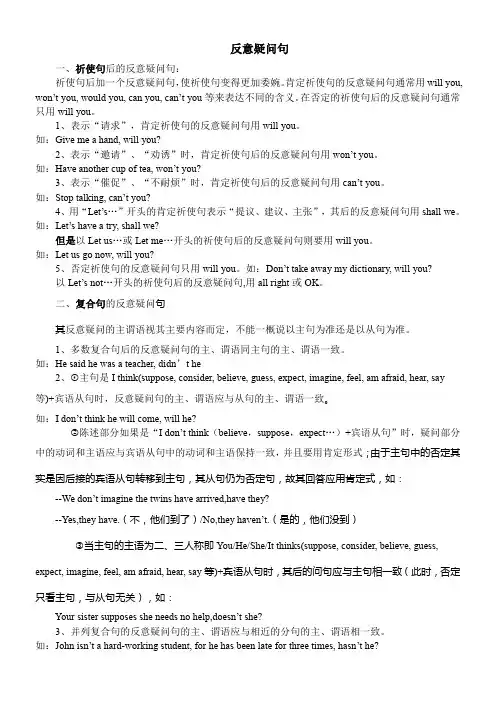
反意疑问句一、祈使句后的反意疑问句:祈使句后加一个反意疑问句,使祈使句变得更加委婉。
肯定祈使句的反意疑问句通常用will you, won’t you, would you, can you, can’t you等来表达不同的含义。
在否定的祈使句后的反意疑问句通常只用will you。
1、表示“请求”,肯定祈使句的反意疑问句用will you。
如:Give me a hand, will you?2、表示“邀请”、“劝诱”时,肯定祈使句后的反意疑问句用won’t you。
如:Have another cup of tea, won’t you?3、表示“催促”、“不耐烦”时,肯定祈使句后的反意疑问句用can’t you。
如:Stop talking, can’t you?4、用“Let’s…”开头的肯定祈使句表示“提议、建议、主张”,其后的反意疑问句用shall we。
如:Let’s have a try, shall we?但是以Let us…或Let me…开头的祈使句后的反意疑问句则要用will you。
如:Let us go now, will you?5、否定祈使句的反意疑问句只用will you。
如:Don’t take away my dictionary, will you?以Let’s not…开头的祈使句后的反意疑问句,用all right或OK。
二、复合句的反意疑问句其反意疑问的主谓语视其主要内容而定,不能一概说以主句为准还是以从句为准。
1、多数复合句后的反意疑问句的主、谓语同主句的主、谓语一致。
如:He said he was a teacher, didn’t he2、①主句是I think(suppose, consider, believe, guess, expect, imagine, feel, am afraid, hear, say 等)+宾语从句时,反意疑问句的主、谓语应与从句的主、谓语一致。
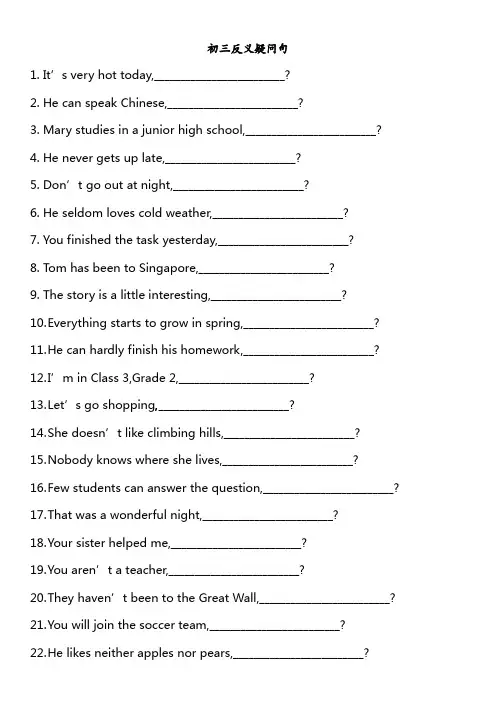
初三反义疑问句1.It’s very hot today,_________________________?2.He can speak Chinese,_________________________?3.Mary studies in a junior high school,_________________________?4.He never gets up late,_________________________?5.Don’t go out at night,_________________________?6.He seldom loves cold weather,_________________________?7.You finished the task yesterday,_________________________?8.Tom has been to Singapore,_________________________?9.The story is a little interesting,_________________________?10.E verything starts to grow in spring,_________________________?11.H e can hardly finish his homework,_________________________?12.I’m in Class 3,Grade 2,_________________________?13.L et’s go shopping,_________________________?14.S he doesn’t like climbing hills,_________________________?15.N obody knows where she lives,_________________________?16.F ew students can answer the question,_________________________?17.T hat was a wonderful night,_________________________?18.Y our sister helped me,_________________________?19.Y ou aren’t a teacher,_________________________?20.T hey haven’t been to the Great Wall,_________________________?21.Y ou will join the soccer team,_________________________?22.H e likes neither apples nor pears,_________________________?23.T here are some good books for you,_________________________?24.L et’s do it now,_________________________?25.Y ou dislike this kind of gifts,_________________________?26.N othing is impossible,_________________________?27.E verything is possible,_________________________?28.H e doesn’t go to school by bus,_________________________?29.T here is little milk lsft in the bottle,_________________________?30.L et us clean the classroom by ourselves,_________________________?31.H e has studied here for about four years,_________________________?32.Y ou never lost money before,_________________________?33.F ew of them hurt themselves in the accident last night,_________________________?34.P eter could hardly see the words on the blackboard,_________________________?35.T here will be a volleyball match in our school,_________________________?36.D on’t smoke in the reading room,_________________________?37.I don’t think he is right,_________________________?38.Y ou must do your homework by yourself,_________________________?39.Y ou mustn’t touch the machine,_________________________?40.S omeone looked for you yesterday,_________________________?1.isn’t it2.can’t he3.doesn’t she4.does he5.will you6.does he7.didn’t you8.hasn’t he9.isn’t it 10.doesn’t it 11.c an he 12.aren’t I 13.shall we 14.does she 15.do they/does he16.c an they 17.wasn’t it 18.didn’t she 19.are you 20.have they21.w on’t you 22.does he 23.aren’t there 24.shall we 25.don’t you 26.i s it 27.isn’t it 28.does he 29.is there 30.will you 31.hasn’t he 32.d id you 33.did they 34. could he 35.won’t there 36.will you37.is he 38.mustn’t you 39.must you 40.didn’t they/didn’t he。
四年级英语反义疑问句练习题30题(带答案)1. You are a student, aren't you?答案:Yes, I am.解析:反义疑问句由两部分组成,前一部分是一个陈述句,后一部分是一个简短的疑问句。
在这个句子中,前面陈述句是“你是一个学生”,后面的简短疑问句“aren't you”是对前面陈述的反问。
回答时,如果事实是肯定的,就用“Yes + 肯定形式”,这里我是学生,所以回答“Yes, I am”。
2. He likes playing football in the park, doesn't he?答案:Yes, he does.解析:前面陈述句说他喜欢在公园踢足球,后面简短疑问句“doesn't he”进行反问。
如果他确实喜欢,回答就是“Yes, he does”,这是因为在英语中,对于反义疑问句,肯定事实用“Yes + 主语+ 助动词(与前面一致)”的形式回答。
3. She is your sister, isn't she?答案:Yes, she is.解析:此句前面陈述她是你的姐妹,后面“isn't she”反问。
当她确实是姐妹时,按照反义疑问句的回答规则,肯定回答为“Yes, she is”。
4. They go to school by bus, don't they?答案:Yes, they do.解析:前面表明他们坐公交车去上学,后面“don't they”反问。
如果事实是他们确实坐公交上学,就要用“Yes, they do”回答,因为这是对肯定事实的回应。
5. Your mother cooks well, doesn't she?答案:Yes, she does.解析:前面说你妈妈做饭做得好,后面“doesn't she”反问。
如果妈妈做饭确实好,就回答“Yes, she does”,这遵循了反义疑问句肯定事实肯定回答的原则。
反意疑问句一、祈使句后的反意疑问句:祈使句后加一个反意疑问句,使祈使句变得更加委婉。
肯定祈使句的反意疑问句通常用will you, won’t you, would you, can you, can’t you等来表达不同的含义。
在否定的祈使句后的反意疑问句通常只用will you。
1、表示“请求”,肯定祈使句的反意疑问句用will you。
如:Give me a hand, will you?2、表示“邀请”、“劝诱”时,肯定祈使句后的反意疑问句用won’t you。
如:Have another cup of tea, won’t you?3、表示“催促”、“不耐烦”时,肯定祈使句后的反意疑问句用can’t you。
如:Stop talking, can’t you?4、用“Let’s…”开头的肯定祈使句表示“提议、建议、主张”,其后的反意疑问句用shall we。
如:Let’s have a try, shall we?但是以Let us…或Let me…开头的祈使句后的反意疑问句则要用will you。
如:Let us go now, will you?5、否定祈使句的反意疑问句只用will you。
如:Don’t take away my dictionary, will you?以Let’s not…开头的祈使句后的反意疑问句,用all right或OK。
二、复合句的反意疑问句其反意疑问的主谓语视其主要内容而定,不能一概说以主句为准还是以从句为准。
1、多数复合句后的反意疑问句的主、谓语同主句的主、谓语一致。
如:He said he was a teacher, didn’t he2、①主句是I think(suppose, consider, believe, guess, expect, imagine, feel, am afraid, hear, say等)+宾语从句时,反意疑问句的主、谓语应与从句的主、谓语一致。
反义疑问句用法及练习题(附答案)反意疑问句用法及练习反意疑问句是指提出情况或者看法,询问对方同意不同意。
这种问句由两部分组成,前一部分是陈述句的形式,后一部分是附着在前一部分上的简短问句,前后两部分要构成反意疑问关系。
又分为两种情况:(1)前一部分为肯定形式,后一部分要为否定形式,即“前肯后否”的形式;或(2)前一部分为否定形式,后一部分则为肯定形式,即“前否后肯”的形式。
具体句式如下:1.0 前肯后否He is a pupil, isn’t he?You are a teacher, aren’t you?We are here, aren’t we?He likes English, doesn’t he?You like English, don’t you?They like English, don’t they?We shall go to the cinema, shan’t we?2.0 前否后肯He isn’t a pupil, is he?You aren’t a teacher, are you?They won’t go to the park tomorrow, will they?I am not a teacher, am I?You haven’t done your homework, have you?3.0陈述部分主、谓语是I am…时,3.1陈述句为肯定句时,反意疑问句用aren't I 或ain't I, 而不是am not I (可用am I not),例如:I'm as tall as your sister, aren't I?I am a doctor, aren’t I?或I am a doctor, ain't I? (慎用)反意问句为否定式时通常要缩写(若不缩写则用较正式的am I not),而am not在标准英语中又没有相应的缩写式,所以人们便用aren’t 来代之。
反义疑问句练习题 1. Linda ate nothing this morning, ___ A. didn’t she B. was she C. did she D. wasn’t she
2. There’s hardly___ milk in the bottle, _____there A. no, isn’t B. some, is C. little, isn’t D. any, is 3. He has never ridden a horse before, ___ A. does he B. has he C. hasn’t he D. doesn’t he 4. — He seldom came here, _____ — Yes sir. A. didn’t he B. does he C. doesn’t he D. did he 5. Everything seems all right, _____ A. does it B. don’t they C. won’t it D. doesn’t it 7. One can’t be too modest, can _____ A. one B. he C. it D. we 8. No one failed in the exam, _____ A. was he B. did one C. did they D. didn’t he 11. He can’t be her father, _____ he A. is B. isn’t C. can D. can’t 12. They have no time to visit the museum, _____ A. do they B. haven’t they C. don’t they D. will they 18. He dislikes the two subjects, _____ he A. does B. doesn’t C. is D. isn’t 19. These tools are useless now, _____ A. are they B. aren’t they C. is it D. isn’t it 23. Let’s go there by bus, ___ A. will you B. shall we C. don’t you D. will you 24. Let us go to play football, ___ A. will you B. shall we C. do we D. are we 25. Don’t forget to give Polly some food and change her water, ___ A. will you B. shall we C. won’t you D. do you 26. — Let’s go shopping this afternoon, _____ — All right. A. will we B. shall we C. don’t we D. are we 27. — Pass me the dictionary, _____ — Yes, with pleasure. A. would you B. will you C. won’t you D. wouldn’t you 30. There is little water in the glass, ____ A. isn’t there B. isn’t it C. is it D. is there 32. There won’t be any concert this Saturday evening, _____ A. will there not B. will there C. is there D. won’t 33. — I guess she taught herself Japanese, ______ — Yes. A. don’t I B. did she C. do I D. didn’t she 34. I don’t believe you are right, _____ A. are you B. do you C. won’t you D. do 35. She doesn’t think that Tom sings best in the class, _____ A. does she B. doesn’t she C. does he D. doesn’t he 37. I know you didn’t want to hurt me, _____ A. did you B. didn’t you C. do I D. don’t I 38. If my father were here he would be very happy, _____ A. weren’t he B. were he C. wouldn’t he D. would he ’s very hot today, _______________ ? 2. He can speak Chinese, _______________ ? 3. Meimei studies in a middle school, _______________ ? 4. He never gets up late , _______________ ? 5. Don’t go out at night, _______________ ? never loves cold weather , _______________ ? 7. You finished the task yesterday, _______________ ? has been to Singapore , _______________ ? story is little interesting, _______________ ? starts to grow in spring, _______________ ? can hardly finish his homework, _______________ ? ’m in Class 3,Grade 2, _______________ ? ’s go shopping , _______________ ? doesn’t like climbing hills , _______________ ? don’t think it is cold today, _______________ 17. You think he is a good flight attendant, _______________ ? knows where she lives, _______________ ? students can answer the question, _______________ likes English, _______________ was a wonderful night, _______________ sister helped him, _______________ is skating, _______________ aren’t a teacher, _______________ haven’t been to the Great Wall, _______________ will join the soccer team, _______________ likes neither apples nor pears, _______________ are some good books for you, _______________ have been there twice, _______________ ’s do it now, _______________ dislike this kind of gifts, _______________ is impossible, _______________ is possible, _______________ doesn’t go to school by bus, _______________ is little milk left in the bottle, _______________ us clean the classroom by ourselves, _______________ has studied here for about four years, _______________ have never lost money before, _______________ of them hurt themselves in the accident last night, _______________ could hardly see the words on the blackboard, _______________ ’s American, _______________ will be a volleyball match in our school, _______________ ’t smoke in the reading-room, _______________
反义疑问句 1. Linda ate nothing this morning, ___? A. didn’t she B. was she C. did she D. wasn’t she 2. There’s hardly___ milk in the bottle, _____there? A. no, isn’t B. some, is C. little, isn’t D. any, is 3. He has never ridden a horse before, ___? A. does he B. has he C. hasn’t he D. doesn’t he 4. — He seldom came here, _____? — Yes sir. A. didn’t he B. does he C. doesn’t he D. did he 5. Everything seems all right, _____ ? A. does it B. don’t they C. won’t it D. doesn’t it 7. One can’t be too modest, can _____ ? A. one B. he C. it D. we 8. No one failed in the exam, _____ ? A. was he B. did one C. did they D. didn’t he 10. Neither you nor I am a artist, _____ ? A. am I B. aren’t we C. are we D. amn’t I 11. He can’t be her father, _____ he? A. is B. isn’t C. can D. can’t 12. They have no time to visit the museum, _____? A. do they B. haven’t they C. don’t they D. will they 14. You’d better go at once, _____ you? A. hadn’t B. did C. didn’t D. don’t 15. You’d rather work than play, _____ you? A. hadn’t B. wouldn’t C. didn’t D. mustn’t 16. You dare not do that, _____ you? A. don’t B. do C. dare D. daren’t 18. He dislikes the two subjects, _____ he? A. does B. doesn’t C. is D. isn’t 19. These tools are useless now, _____ ? A. are they B. aren’t they C. is it D. isn’t it 20. He used to get up at 6:30, _____ he? A. didn’t he B. did he C. used he D. wouldn’t he 22. He ought to win the first prize, _______ he? A. mustn’t B. oughtn’t C. shouldn’t D. Both B and C. 23. Let’s go there by bus, ___? A. will you B. shall we C. don’t you D. will you 24. Let us go to play football, ___? A. will you B. shall we C. do we D. are we 25. Don’t forget to give Polly some food and change her water, ___? A. will you B. shall we C. won’t you D. do you 26. — Let’s go shopping this afternoon, _____? — All right. A. will we B. shall we C. don’t we D. are we 27. — Pass me the dictionary, _____? — Yes, with pleasure. A. would you B. will you C. won’t you D. wouldn’t you 30. There is little water in the glass, ____? A. isn’t there B. isn’t it C. is it D. is there 32. There won’t be any concert this Saturday evening, _____ ? A. will there not B. will there C. is there D. won’t 33. — I guess she taught herself Japanese, ______? — Yes. A. don’t I B. did she C. do I D. didn’t she 34. I don’t believe you are right, _____ ? A. are you B. do you C. won’t you D. do 35. She doesn’t think that Tom sings best in the class, _____ ? A. does she B. doesn’t she C. does he D. doesn’t he 37. I know you didn’t want to hurt me, _____ ? A. did you B. didn’t you C. do I D. don’t I 38. If my father were here he would be very happy, _____ ? A. weren’t he B. were he C. wouldn’t he D. would he
Key: 1—5 CDBDD 6—10 BACDC 11—15 AABAB 16—20 CCBBA 21—25CDBAA 26—30 BBBAD 31—35 BBDAA 36—38 AAC 标签:教育 一、单选:(每题1分,共30分) 1、Few of them hurt themselves in the accident last night,________ A. don’t they B. didn’t they C. did they D. do they 2、 -You’ve never seen dinosaur eggs, have you ? --_____. How I wish to visit the Dinosaur World. A. Yes, I have B. No, I haven’t C. Certainly, I have D. Of course, I haven’t 3、His sister had a bad cough, ______she? A. wasn’t B. doesn’t C. hadn’t D. didn’t 4、Mr. Green went to Shenzhen on business last week,________? A. isn’t he B. doesn’t he C. didn’t he D. hasn’t he 5、 ohn can hardly understand any Chinese, _________he? A. Can’t B. doesn’t C. can D. does 6、Don’t smoke in the meeting-room,_________? A. do you B. will you C. can you D. could you 7、Lucy, you clean the blackboard today,_______ A. do you B. did you C. will you D. can you 8、 Miss Cheng will never forget her first visit to Canada ,________? A. will she B. won’t she C. isn’t she d. wasn’t she 9、The lady couldn’t say a word when she saw the snake,________? A. could the lady B. couldn’t the lady C. could she D. couldn’t she 10、----________sweater is this? ----I think it’s Peter’s. A. Who B. What C. Which D. Whose 11、---______I go and meet you at the airport? ---No ,thanks, dear . I can take a taxi home. A. Will B. Do C. Shall D. Should 12、------_____is the Confucian Temple(孔庙) from here? ------It’s about 10 minuters’ walk.